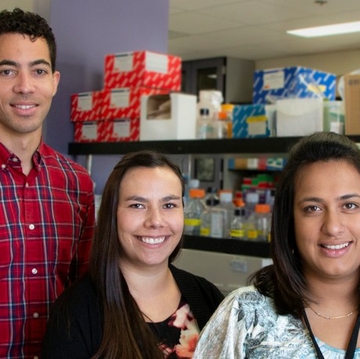
Beyond the Bench
Three doctoral students to represent UNM Cancer Center at International AACR Translational Biology Workshop
Muskan Floren, Richard Pepermans and Melanie Rivera spend lots of time in their labs, but they hope their work will reach outside of it. Each would like to create better screens, detection tools or treatments that help people beat cancer.
The three doctoral students at The University of New Mexico Comprehensive Cancer Center will attend a November workshop in Boston hosted by the American Association for Cancer Research where they will learn how to expand their research to one day reach patients.
The workshop will offer lectures and group discussions to basic scientists who are starting their careers, to help them learn about the complexities of adapting their research for use in a clinic or hospital.
Floren already understands something about such complexity. Having spent three years working at a drug manufacturer, she knows that repeating experiments on a larger scale doesn't always give the resounding results that the original, smaller feasibility studies might have shown.
Floren wants to understand why people with acute myeloid leukemia, a cancer that starts in cells that turn into infection-fighting white blood cells, relapse after initially responding well to chemotherapy. She studies a protein called CD82, which is found on the surface of those leukemia cells. Cells with more CD82 are more likely to move to the bone marrow, and Floren thinks the protein might be helping those cells hide out there. Targeting CD82 on those cells could improve chemotherapy outcomes, she suspects.
Floren hopes the workshop will help her apply her research knowledge to a screening test that helps doctors decide which treatments would work best for each person. "There's a clinical aspect I think I'm lacking," she says, adding that she'd like to work more closely with the doctors who treat the disease.
Pepermans echoes the same sentiment. He studies resistance to anti-hormone therapy in people with estrogen-receptor positive breast cancer and is developing a new treatment that would work by altering the behavior of breast cancer cells.
Current drugs, he says, can set off cascades of chemical changes in a cell that can result in resistance to the drugs. Pepermans has created a new molecule that would target a smaller set of cascades, hopefully reducing the chance of resistance and increasing breast cancer cell death.
"The goal of my work," Pepermans says, "is to ultimately make a difference in peoples' lives." He has tested his new molecule in cell cultures and in animals but has not yet completed preclinical studies.
Rivera was drawn to cancer research because of its complexity. "There are a lot of different questions that we can be answering, from different angles, with different techniques," she says. At the workshop, she's looking forward to learning from a variety of doctors, scientists and other students.
Rivera works with a graduate student in UNM's Department of Computer Science to study a protein called Rac1, which acts like a switch inside a cell. Women whose ovarian cancer has spread have a lot of the protein in their tumor cells. Rivera wants to understand whether Rac1 causes the cancer to spread and how it signals other proteins to drive cell changes.
Rivera feeds the results from her lab experiments into a computer model that predicts cancer cell behavior and hopes her work will lead to a test or screen for women with ovarian cancer. "We would like to know," she says, "which treatment options will be the most effective for them."
Muskan Floren, Richard Pepermans and Melanie Rivera are doctoral students in the Biomedical Sciences Graduate Program at The University of New Mexico Health Sciences Center. Their mentors are faculty at the UNM Comprehensive Cancer Center.
The 'Translational Cancer Research for Basic Scientists Workshop' takes place November 4 through 9 in Boston, Mass.
